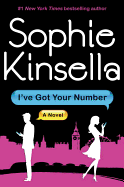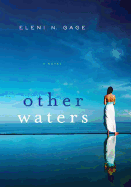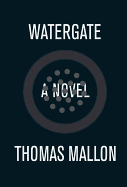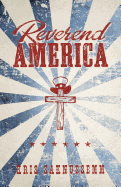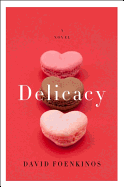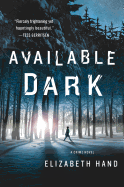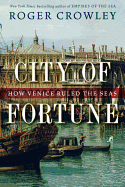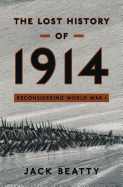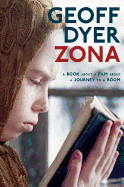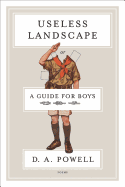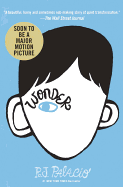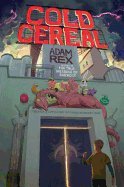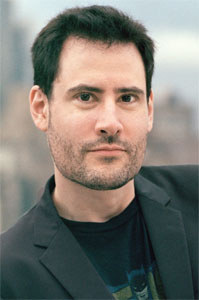 Josh Bazell's new novel, Wild Thing (Reagan Arthur Books), is the sequel to his debut, Beat the Reaper, "an outrageous, shocking, darkly humorous thriller, with footnotes, no less." When we noted it was not necessary to have read his debut to enjoy Wild Thing, he said, "I wanted it to be as different as possible, but still meet the expectations of the fans of the first book. You try and replicate some of the effects on the reader without replicating the book." He went on to quote author James Rollins: "When was the last time the 18th book in a series was your favorite?"
Josh Bazell's new novel, Wild Thing (Reagan Arthur Books), is the sequel to his debut, Beat the Reaper, "an outrageous, shocking, darkly humorous thriller, with footnotes, no less." When we noted it was not necessary to have read his debut to enjoy Wild Thing, he said, "I wanted it to be as different as possible, but still meet the expectations of the fans of the first book. You try and replicate some of the effects on the reader without replicating the book." He went on to quote author James Rollins: "When was the last time the 18th book in a series was your favorite?"
Wild Thing takes place fairly soon after the events in Beat the Reaper. The main character from the first book, Pietro Brwna, has a new name--Lionel Azimuth--and a set of fake medical degrees. He's working on a cruise ship, curing hangovers and avoiding the other staff as much as possible.
Azimuth "started out more as an exemplar of my own anxiety of having my personality erased if I went to medical school. I wanted someone who would get through med school and not lose his personality, so I needed someone strong, and ideally someone with a personality that was oppositional to medicine. So it made sense for him to kill people, instead of save them, in his other life."
In addition, Bazell said, for the character, the job "is not only innately unbearable, but particularly unsuited to him because he has issues with the ocean. There's an obvious element of self-punishment in his choices of where to end up, which he likes to portray to others as his only choice.
"What I love about him as a character is that he thinks he's perfectly cynical, but he always ends up in situations where the world turns out to be even worse than he thought it was. To me, that's sort of noir in a nutshell."
The obvious question, then, is why does Josh Bazell--who's on leave from a medical residency at University of California, San Francisco--identify with such a cynical character? "Medicine is a difficult field of study," he said. "People tend to do it because maybe they feel that whatever they were doing previously did not have value. What I love about medicine is that you can be depressed, you can be unsure of where your life is going in the long run, but you spend the day doing something that at the end of the day, you're glad you did. At least you helped somebody, even if it wasn't yourself."
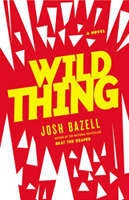 The romantic interest in this book is Violet Hurst, who's a fully realized character, not just a foil for Azimuth. And Violet will be back: Bazell is working on a third book right now, among other projects. It will be bigger in scope than either of the first two, with the main antagonist from Beat the Reaper coming into sharper focus to help close out the Mafia plot line, one that is "essentially on hiatus in Wild Thing."
The romantic interest in this book is Violet Hurst, who's a fully realized character, not just a foil for Azimuth. And Violet will be back: Bazell is working on a third book right now, among other projects. It will be bigger in scope than either of the first two, with the main antagonist from Beat the Reaper coming into sharper focus to help close out the Mafia plot line, one that is "essentially on hiatus in Wild Thing."
Bazell addresses some current issues in his books. "The thing with the environmentalism in Wild Thing is that I went after it as sort of a typical noir example of corruption being harmful to the innocent," he said. "Nonetheless, I think those environmental issues are quite real. When one gets out of the typical short-term reporting of such things and reads actual books on the topic, one gets pretty frightened about what's going to happen."
So who better to represent the current political climate about climate change? Sarah Palin, of course. Said Bazell: "The book is in some sense about how far you can push reality away, and the way in which it storms back when you do that. I wanted somebody to come in--I wanted that feeling of invasion in the book."
Bazell sees novels as unable to be apolitical, even when they expressly pretend not to be. At the end of the day, however, he's engaged in entertainment. "If a novel is not entertaining," he said, "then it's not good and it needs to be redone. I spent a lot of effort on making it fly as a novel. My goal is always to require the reader to bring as little energy as necessary to the book and nonetheless be able to get through it and have a good time."
Bazell has a few words of wisdom for the would-be novelist: "Write the book you want to read. People go to the bookstore and see a lot of crap and think they should just write crap; that's not a successful strategy. Anybody can write crap. Just figure out what you want to write or read right now, and go from there." --Rob LeFebvre, freelance writer and editor
Josh Bazell: Noir in a Nutshell
 No matter who wins Oscars this coming Sunday, books will be winners. That's because this year even more than usual, nominations in a variety of categories involve movies based on books. For best picture, for example, six of the nine nominees are adapted from books, and another, Woody Allen's Midnight in Paris, stars several literary figures from the 1920s, including Gertrude Stein, Zelda and Scott Fitzgerald, T.S. Eliot and Djuna Barnes. (In the movie, Corey Stoll offered a masterful portrayal of Ernest Hemingway.) It's enough to make you wonder what would happen to the movie business if books vanished. For an annotated list of this year's many book-related nominees, click here.
No matter who wins Oscars this coming Sunday, books will be winners. That's because this year even more than usual, nominations in a variety of categories involve movies based on books. For best picture, for example, six of the nine nominees are adapted from books, and another, Woody Allen's Midnight in Paris, stars several literary figures from the 1920s, including Gertrude Stein, Zelda and Scott Fitzgerald, T.S. Eliot and Djuna Barnes. (In the movie, Corey Stoll offered a masterful portrayal of Ernest Hemingway.) It's enough to make you wonder what would happen to the movie business if books vanished. For an annotated list of this year's many book-related nominees, click here.


 Josh Bazell's new novel, Wild Thing (Reagan Arthur Books), is the sequel to his debut,
Josh Bazell's new novel, Wild Thing (Reagan Arthur Books), is the sequel to his debut,  The romantic interest in this book is Violet Hurst, who's a fully realized character, not just a foil for Azimuth. And Violet will be back: Bazell is working on a third book right now, among other projects. It will be bigger in scope than either of the first two, with the main antagonist from Beat the Reaper coming into sharper focus to help close out the Mafia plot line, one that is "essentially on hiatus in Wild Thing."
The romantic interest in this book is Violet Hurst, who's a fully realized character, not just a foil for Azimuth. And Violet will be back: Bazell is working on a third book right now, among other projects. It will be bigger in scope than either of the first two, with the main antagonist from Beat the Reaper coming into sharper focus to help close out the Mafia plot line, one that is "essentially on hiatus in Wild Thing."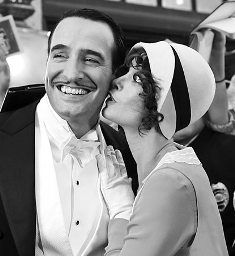 In a throwback to old times, The Artist, a French silent movie, has garnered 10 Oscar nominations, including one for best picture. It's as if 80 years from now, assuming the most dire predictions come true and there are only e-books published, a physical book becomes book of the year.
In a throwback to old times, The Artist, a French silent movie, has garnered 10 Oscar nominations, including one for best picture. It's as if 80 years from now, assuming the most dire predictions come true and there are only e-books published, a physical book becomes book of the year.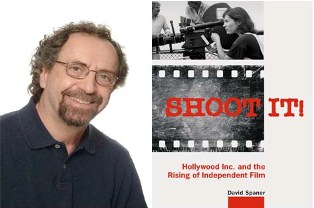 "I think silent movies were the best," Romanian filmmaker Bogdan Apetri told me. "Cinema means visuals. Talk has so many other arts--theater, literature, music. And silent movies were just cinema at its purest." --
"I think silent movies were the best," Romanian filmmaker Bogdan Apetri told me. "Cinema means visuals. Talk has so many other arts--theater, literature, music. And silent movies were just cinema at its purest." --